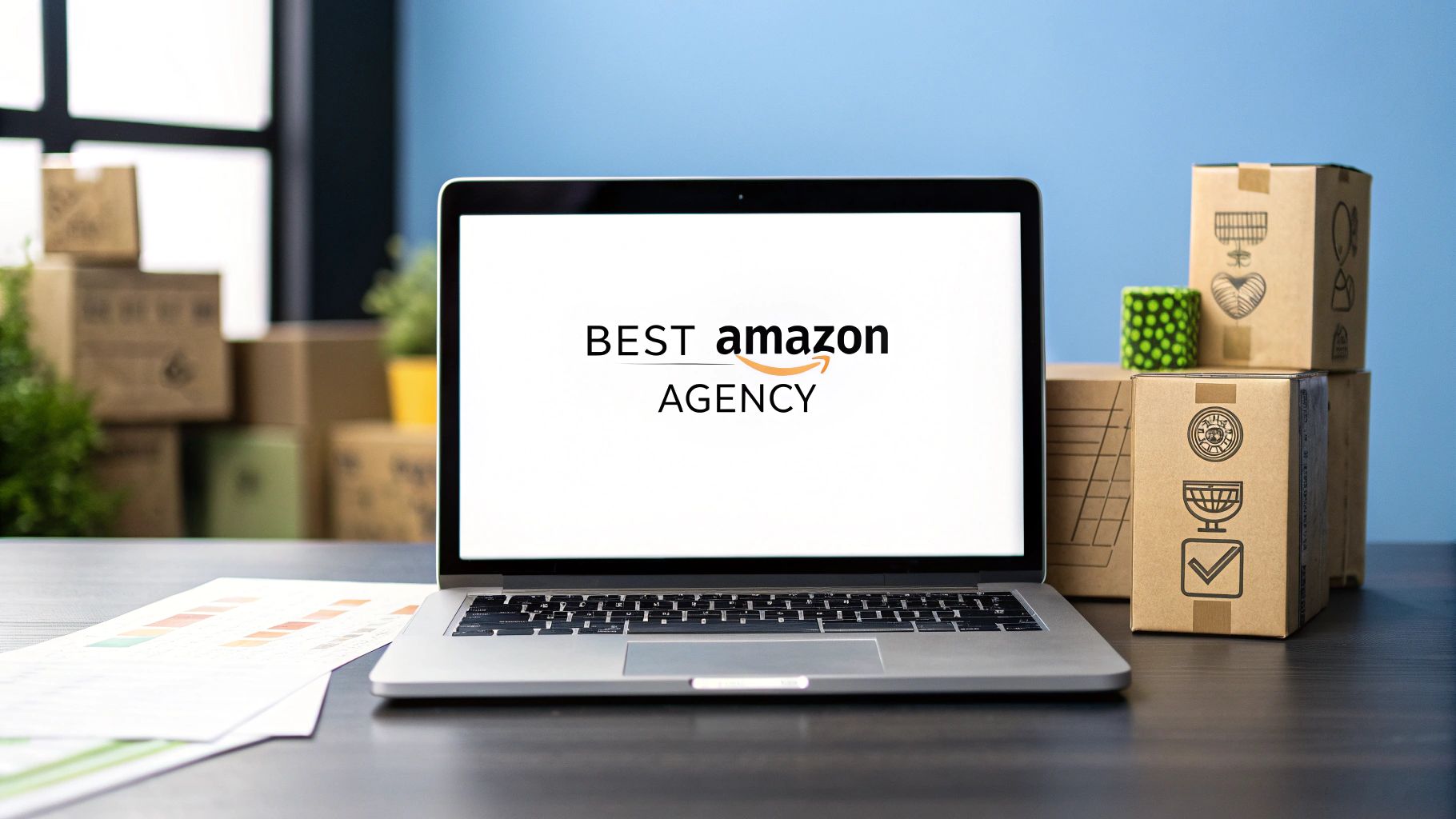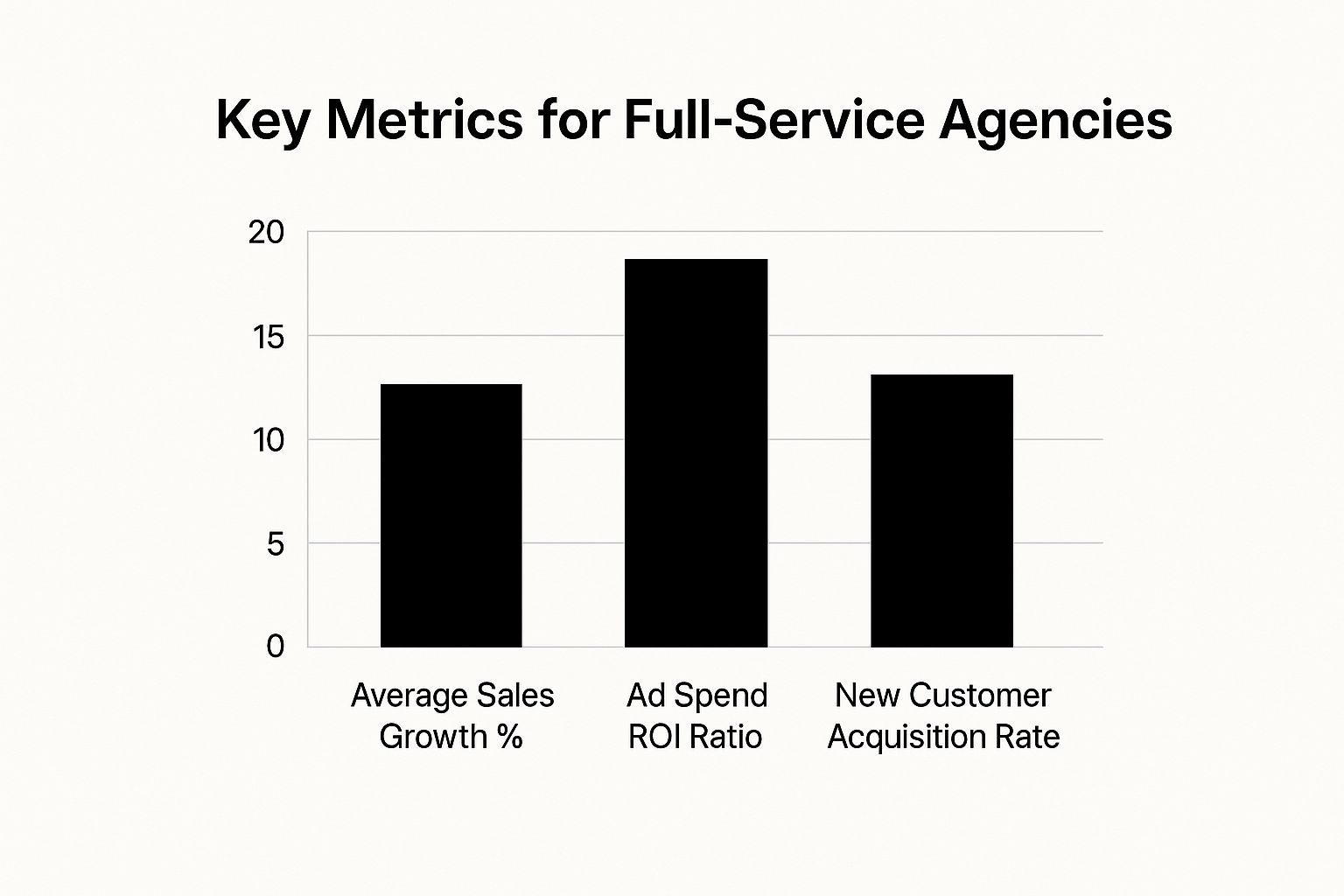Stay Updated with Everything about MDS
Thank you! Your submission has been received!
Oops! Something went wrong while submitting the form.

Chilat Doina
July 22, 2025
Let's be real for a moment: succeeding on Amazon isn't just about having a great product anymore. It's a hyper-competitive jungle, and simply listing your items and hoping for the best is a surefire way to get lost in the crowd. This is the exact reason why so many smart brands are now looking for the best full service Amazon agency.
They aren't just outsourcing tasks; they're bringing on a strategic partner. This kind of partnership lets you get back to what you do best—innovation, product development, and big-picture strategy—while the experts wrestle with the ever-changing beast that is the Amazon marketplace.
Honestly, managing a successful Amazon store is a full-time job. In fact, it's more like several full-time jobs rolled into one. You need to be an expert in logistics, a master of advertising, fluent in compliance, and a guru of customer engagement. This is where a top-tier agency earns its keep. They’re built from the ground up to manage all this complexity at scale.
For a lot of brands, the tipping point comes when they realize they're spending all their time reacting to problems—a sudden dip in sales, a confusing new policy, a competitor outbidding them—instead of proactively building their business. An agency's job is to completely flip that dynamic.
Going it alone might seem like the cheapest route at first, but the hidden costs can be staggering. We're not just talking about money. Think about the lost time, the missed growth opportunities, and the sheer mental energy drained from you and your core team.
I’ve seen brand owners lose entire days trying to fix a suppressed listing or make sense of a plummeting ad performance. That’s time that could have been poured into developing the next bestseller or planning a major launch.
A full-service Amazon agency is designed to eliminate this operational drag. They bring a few key things to the table:
The biggest shift you'll feel when partnering with a great agency is moving from a reactive, "fire-fighting" mode to a proactive growth model. Instead of just putting out fires, you have a dedicated team constantly optimizing every single part of your Amazon presence. This covers everything from fine-tuning your supply chain to protecting your brand from counterfeiters.
The impact is almost always measurable. Take a look at the typical performance boosts brands see after bringing on a full-service partner.

As you can see, the data consistently shows that agencies drive higher sales growth and a much better return on ad spend. They achieve this by applying integrated strategies that a busy, in-house team simply doesn't have the bandwidth to execute.
And in this marketplace, you need every advantage you can get. The competition is fierce, with over 9.7 million sellers globally and around 1.9 million in the U.S. alone. In a field that crowded, professional management isn't a luxury; it's a critical tool for survival and growth. For a deeper dive into these numbers, you can explore more Amazon data and what it means for sellers on Analyzer.Tools.
To really understand the difference, let's break down the day-to-day realities of managing your store yourself versus handing the reins to an expert team.
This table really puts it into perspective. The agency model isn't just about offloading work; it's about upgrading your entire operational engine from a standard sedan to a high-performance race car.

Before you even start looking for a partner, you need to do some serious homework. Hiring an agency without knowing exactly what you want to achieve is like setting sail without a map. Sure, you'll be busy and spending money, but you'll have no idea if you're actually getting anywhere.
The first, and frankly most critical, step is to look inward. This simple act turns your vague hunt for "more sales" into a focused mission to find a strategic partner who can solve your specific problems.
First thing's first: take a hard, honest look at your Amazon business. I'm not just talking about top-line revenue. You need to get your hands dirty, dig into the operational weeds, and figure out what’s really holding you back. A clear diagnosis is the only way to find the right cure.
Are any of these keeping you up at night?
Getting specific here is non-negotiable. An agency that's a genius at slashing ACoS might be completely lost if your real problem is a tangled supply chain. Being brutally honest with yourself at this stage will save you thousands of dollars and a massive headache down the road.
If you need a framework for this audit, checking out a solid guide on what makes for the best Amazon agency can give you some valuable perspective.
Okay, so you've identified your biggest challenges. Now what? You have to translate those problems into concrete, measurable Key Performance Indicators (KPIs). This is what separates a professional, goal-oriented brand from one that’s just throwing money at a problem and hoping for the best.
A great agency partner isn't a mind reader. They need a clear scorecard to understand what success looks like for your brand. Providing specific metrics from day one sets the stage for a transparent and results-driven relationship.
Instead of just saying "I want to grow," you need to present specific targets that an agency can actually build a strategy around. This approach turns your needs into a language that high-caliber agencies not only understand but respect.
Here’s how you can reframe those vague goals into something an agency can sink their teeth into:
This level of clarity accomplishes two huge things. It immediately filters out the fluff and attracts serious, data-driven agencies. And second, it gives you an objective yardstick to measure their performance once they're on board. This upfront work is your absolute best insurance against a failed partnership and wasted ad spend.

The term "full-service" gets thrown around a lot. Frankly, it can mean anything and everything. A slick sales deck listing a dozen services is one thing; having battle-tested, in-house expertise is another entirely.
Your job is to get past the marketing fluff and figure out what an agency really does well. Finding a true full-service partner means confirming they have deep, provable mastery in a few non-negotiable areas of the Amazon flywheel.
This isn’t about ticking boxes. It’s about making sure they have the strategic depth and technical chops to actually grow your brand.
Every single agency will tell you they do Amazon SEO and PPC. That's table stakes. The real question is, how deep does their knowledge actually go?
A top-tier agency will have a proven system for effective advertising campaign management, from high-level strategy all the way down to daily bid adjustments. You need to push past the surface-level questions.
Instead of asking, "Do you handle PPC?" try these instead:
You're listening for specific, confident answers. Vague replies loaded with buzzwords are a huge red flag. They should sound like they've done this a thousand times.
(If you want to brush up on your own ad game, our guide on Amazon advertising optimization is a great place to start.)
A gorgeous A+ Content page that doesn't convert is just a pretty picture. A great agency understands that creative and operations are two sides of the same coin. They need to be just as comfortable talking about brand storytelling as they are about the nitty-gritty of inventory forecasting.
Your agency should be a master of both the art and the science of Amazon. They need to create a brand experience that captivates customers while ensuring the backend logistics run like clockwork to fulfill those orders flawlessly.
Don't underestimate the operational side of things. It's massive. With roughly 80% of sellers using Fulfillment by Amazon (FBA), a system that demands expert management, any agency that can't speak fluently about inventory health, storage fees, and supply chain is not "full-service."
The best agencies aren't just using the same off-the-shelf software as everyone else. They're often building and integrating their own proprietary tech to find an edge. With 34% of sellers now using AI for tasks like listing creation, an agency without a clear tech strategy is already falling behind.
Ask them directly about their tech stack.
Their answers will tell you everything you need to know. Are they just managing your account, or are they a true strategic partner armed with the advanced tools needed to win?
Any agency can put together a killer sales pitch. That’s their job. But what really counts is their track record—the actual, verifiable results they've delivered for brands like yours.
Polished testimonials and carefully selected case studies on a website are just the opening act. To find the best full service Amazon agency, you've got to roll up your sleeves and do some real detective work. You need to verify their claims and, just as importantly, see if their style meshes with your own.
Your first move? Dissect their case studies. Don't just get starry-eyed over the big, flashy growth numbers. Look for relevance. Ask yourself: are these success stories for brands in my category? Are they a similar size to my business? Were they facing the same headaches I am right now?
A home goods brand seeing a 300% sales lift is fantastic for them, but what does that have to do with your high-performance supplement line? The strategies might not be transferable, so you need to look closer.
You’re looking for proof that they genuinely get your specific corner of the Amazon universe. An agency that has already wrestled with the complexities of your category—whether it’s navigating tricky FDA compliance for topicals or handling the logistical nightmare of oversize furniture—is going to be lightyears ahead of one that's learning on your dime.
As you look through their portfolio or talk to their team, ask for specific examples of their work with brands that mirror yours. And listen carefully to how they talk. Do they speak your language? Do they understand your customer, your competition, and the unique challenges you face? If they do, it'll be obvious.
Once you've zeroed in on a few promising case studies, it's time to ask to speak directly with those clients. This is a deal-breaker. If an agency gets cagey or outright refuses to provide client references, that’s a massive red flag. Run, don't walk.
When you get on these calls, you need to go deeper than the generic, "So, are you happy with them?" Your mission is to uncover what the day-to-day partnership actually feels like.
Here are some questions I always ask to get the real story:
Cultural fit is the invisible thread that holds a great agency partnership together. A team that shares your work ethic, communication style, and long-term vision will feel less like a vendor and more like an extension of your own team.
Ultimately, you're hunting for consistency. Does the agency's sales pitch match what their clients are actually experiencing? This investigative work is absolutely crucial. Finding an agency with proven results is one thing, but finding one whose culture and operational style click with yours—that's the key to a long-term partnership that actually grows your business.

This is where the rubber meets the road. Talking money and contracts can feel like the most daunting part of choosing an agency, but it doesn't have to be. Once you understand the common pricing models, you can quickly figure out which one fits your budget and, more importantly, your growth ambitions.
Let's break down the most common structures you'll run into.
The simplest is often a monthly retainer. You pay a flat fee, and the agency delivers a clearly defined set of services. It’s predictable, which is great for budgeting, and it works well for brands that need consistent, hands-on management across their account.
Another frequent model is a percentage of ad spend (PoAS). Here, the agency's fee is tied directly to your advertising budget. This model inherently motivates them to manage your ad dollars wisely because their compensation is linked to your investment in growth.
For brands who are all about the bottom line, a revenue-sharing model can be a fantastic fit. The agency takes a percentage of the revenue they help you generate. This creates a powerful partnership—they don't make more money unless you do. It's a bold model that works best when you're confident in your product's ability to scale.
Lately, many of the sharpest agencies have moved toward hybrid models. These are designed to offer the best of both worlds. A popular setup is a smaller monthly retainer combined with a percentage of revenue growth. This gives the agency some stability while keeping them laser-focused on pushing your sales higher. It’s a balanced approach that aligns everyone's goals. If you're exploring different growth strategies, you can learn more about how to boost ecommerce sales and see which pricing model aligns best.
Don't let a contract intimidate you. Think of it as a blueprint for your partnership. A good contract protects both parties by creating total clarity on expectations, deliverables, and what happens when things change.
Once you've landed on a pricing structure you like, it's time to review the contract. Do not just skim this document. The fine print is where the entire relationship is defined, and you need to understand every word.
Here are the clauses I always tell people to zoom in on:
Getting these details buttoned up from the start is how you build a partnership on a foundation of trust, not confusion.
Deciding to hand over the reins of your brand on Amazon is a huge step. It’s a big investment, and you’re right to be asking tough questions before you sign on the dotted line. Getting straight, honest answers is the only way to build a real partnership and set everyone up for success.
Let's tackle some of the most common things brands ask when they're on the hunt for the best full service Amazon agency. We want you to walk into this decision with your eyes wide open.
This is usually the first question out of everyone's mouth: "So, how fast will we see a return?" Everyone wants to see the sales graph shoot up overnight, but let's be real—a solid, sustainable strategy needs time to marinate. Rushing things is just a fast track to burning through your ad budget on bad decisions.
A more practical timeline breaks down into a couple of phases:
Expecting a home run in your first month is a recipe for disappointment. Real, lasting growth on Amazon is a marathon, not a sprint. Any good agency will lay out a clear 90-day roadmap that’s all about sustainable gains, not just vanity metrics that look good for a week.
The best results come from true partnerships, not a simple "we pay you, you do work" transaction. Your success is tied directly to clear communication and mutual trust. To get the most bang for your buck, you can't just be a bystander.
You need to set a communication rhythm right from the start. A weekly check-in call and a detailed monthly performance review are pretty standard. But it's a two-way street. Be ready to share what's happening on your end—things like inventory forecasts, plans for new product launches, or your broader business goals. The more context you give your agency, the sharper their strategy will be.
At the end of the day, your job is to hold the strategic vision for your brand. Their job is to execute that vision flawlessly on the Amazon platform.
This is a critical distinction that, frankly, too many brands gloss over. A general digital marketing firm might be fantastic at running Google Ads or managing your social media, but Amazon is a completely different universe. Its search algorithm, ad platform, and operational rules are unlike anything else out there.
Here’s the fundamental difference:
For instance, a generalist might get hung up on PPC click-through rates. A true Amazon pro knows that your PPC performance is directly linked to your inventory levels, your listing's conversion rate, and your organic rank—and they know how to pull all those levers in harmony.
Choosing a specialist isn't just a matter of preference; for a competitive marketplace like Amazon, it’s a strategic necessity.
Join the Ecom Entrepreneur Community for Vetted 7-9 Figure Ecommerce Founders
Learn MoreYou may also like:
Learn more about our special events!
Check Events